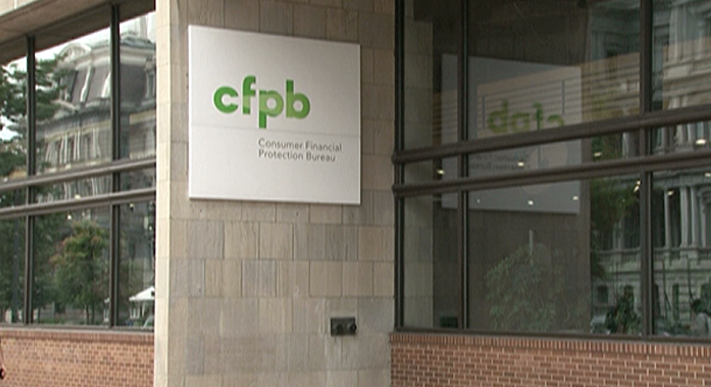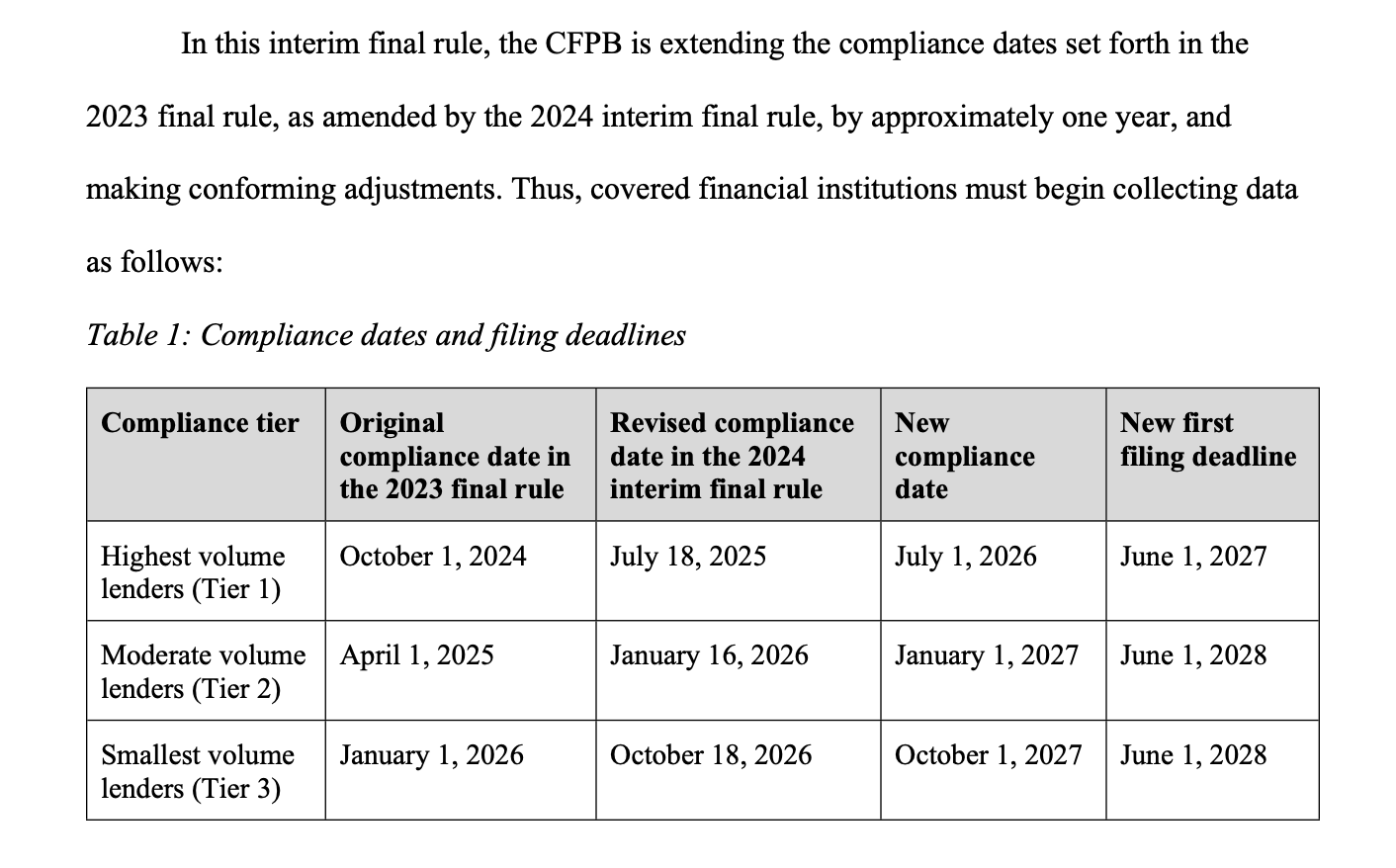Regulation
CFPB’s Funding Cut Almost in Half
July 3, 2025The current Administration’s “Big Beautiful Bill” that passed Thursday includes a paragraph that modifies the CFPB’s annual funding budget. In 2010, The Consumer Financial Protection Act, which created the CFPB, stipulated that that no more than twelve percent of the annual total operating expenses of the Federal Reserve System shall be transferred to the agency. The new law has amended that down to 6.5%.
For perspective, the CFPB received $729.4M from the Fed in FY 2024 but could have drawn up to $785.4M. Had the new cap already been in place, the agency would’ve only been entitled to take up to $425M.
All eyes had been on the CFPB in the small business finance industry where massive regulations relating to how such companies collect data were supposed to have gone into effect this month. The agency ultimately suspended compliance with the rules by one year and said it intends to rewrite those rules in the interim. The agency is required by the fifteen year-old statute to implement some form of data collection on small business lending.
Texas Governor Signs Sales-Based Financing ACH Prohibition Into Law
June 21, 2025 Texas Governor Greg Abbott has signed HB 700 which prohibits a sales-based financing provider from automatically debiting any merchant in the state unless they are in a perfected 1st position. And not just a 1st position MCA, a 1st position above anything else at all. It doesn’t matter if the funder doing the debiting is located out of state, only that the merchant be located in Texas.
Texas Governor Greg Abbott has signed HB 700 which prohibits a sales-based financing provider from automatically debiting any merchant in the state unless they are in a perfected 1st position. And not just a 1st position MCA, a 1st position above anything else at all. It doesn’t matter if the funder doing the debiting is located out of state, only that the merchant be located in Texas.
The law broadly encompasses purchase transactions (MCAs) or loans where the payments ebb and flow with sales activity (revenue-based finance loans). Companies with a special bank relationship are exempt from the law. The exemption applies to: “a bank, out-of-state bank, bank holding company, credit union, federal credit union, out-of-state credit union, or any subsidiary or affiliate of those financial institutions.”
The specific language detailing the prohibition is:
CERTAIN AUTOMATIC DEBITS PROHIBITED.
A provider or commercial sales-based financing broker may not establish a mechanism for automatically debiting a recipient’s deposit account unless the provider or broker holds a validly perfected security interest in the recipient’s account under Chapter 9, Business & Commerce Code, with a first priority against the claims of all other persons.
The full law goes even further than the ACH ban, the extent of which can be viewed here. The law goes into effect on September 1, 2025.
CFPB Small Business Lending Rule Compliance Delayed a Year
June 17, 2025 The CFPB has officially hit the pause button on complying with the small business lending data collection rules. They were supposed to go into effect next month. The Agency, however, announced in April that it planned to rewrite all of the rules and would not enforce them in the interim. Alas, covered parties wondered if they were still required to comply regardless of the whims on enforcement. Consequently, a new deadline for compliance was set for July 1, 2026. That assumes the new rules are ready by then or that there are no further delays.
The CFPB has officially hit the pause button on complying with the small business lending data collection rules. They were supposed to go into effect next month. The Agency, however, announced in April that it planned to rewrite all of the rules and would not enforce them in the interim. Alas, covered parties wondered if they were still required to comply regardless of the whims on enforcement. Consequently, a new deadline for compliance was set for July 1, 2026. That assumes the new rules are ready by then or that there are no further delays.
The rules have technically been delayed by fifteen years already since the law requiring such rules to be implemented was passed in 2010 (Dodd-Frank). Other priorities, politics, debates over the legislation’s scope, and endless litigation relating to it pushed back rule-making and compliance to where it is now. During Trump’s first term, there was even disagreement as to what the CFPB should even be called. deBanked has been covering the law for more than 10 years.
The law had previously been deemed applicable to both loans and merchant cash advances. The rules had been codified in 888 pages of guidelines.

The Battle Against MCA in Texas
June 12, 2025David Roitblat is the founder and CEO of Better Accounting Solutions, an accounting firm based in New York City, and a leading authority in specialized accounting for merchant cash advance companies.To connect with David or schedule a call about working with Better Accounting Solutions, email david@betteraccountingsolutions.com.
 Texas, a state associated with limited government intervention and freedom of business to operate and succeed in a capitalist society, stands at a crossroads.
Texas, a state associated with limited government intervention and freedom of business to operate and succeed in a capitalist society, stands at a crossroads.
Governor Greg Abbott has until June 22nd to decide whether to sign House Bill 700 into law—a decision that could fundamentally reshape how small businesses access capital in the Lone Star State. If he signs it, or simply lets the deadline pass without action, this sweeping legislation will take effect on September 1, 2025. The action will potentially cut off vital funding sources for thousands of Texas entrepreneurs, in a direct assault on the merchant cash advance industry that has been a lifeline for the people of his state.
The stakes couldn’t be higher. While supporters frame HB 700 as consumer protection, this bill targets sales-based financing—financial tools that have become lifelines for small businesses shut out of traditional bank lending.
Small business owners know the frustration of walking into a bank and walking out empty-handed all too well. Traditional lenders have tightened their belts, especially for newer businesses, minority-owned enterprises, and companies in industries deemed “risky.” When a restaurant owner needs quick capital to fix a broken freezer, or a contractor requires funds to purchase materials for a big job, they can’t wait weeks for a bank’s approval process. They need solutions now.
That’s where alternatives come in. Revenue-based financing provides capital based on future sales, not credit scores or lengthy financial histories. Yes, they can be more expensive than bank loans—but they’re also available when banks say no.
This financing drives business growth, job creation, and the health of Main Street. When small businesses can access capital quickly, they expand, hire employees, and strengthen their communities.
HB 700 goes far beyond simple disclosure requirements. While transparency is important—and most responsible providers already provide clear terms—this bill creates a regulatory maze that could price many providers out of the Texas market entirely.
The bill imposes sweeping new requirements that will fundamentally change how sales-based financing companies operate in Texas. Companies providing commercial sales-based financing must register with the Office of Consumer Credit Commissioner by December 31, 2026, including both direct providers and brokers, with mandatory annual renewals and fees.
For any financing under $1 million, sales-based financing providers must provide extensive disclosures covering everything from total financing amounts and disbursement details to payment schedules, additional fees, prepayment penalties, and even broker compensation arrangements. The operational restrictions go much deeper, voiding confession of judgment clauses entirely and requiring companies to obtain recipient signatures on all disclosures before finalizing any transaction.
Perhaps most problematic is the prohibition on automatic debiting of recipient accounts unless companies hold a “validly perfected first-priority security interest”—a legal standard that’s nearly impossible to meet in practice and effectively kills the streamlined payment processes that make revenue-based financing work for the funders, and by extension, the merchants.
The Finance Commission of Texas gains broad authority to identify and prohibit “unfair, deceptive, or abusive” practices, though interestingly, they cannot set maximum interest rates or fees. Violations carry steep civil penalties of $10,000 each, and the law applies to any provider offering services to Texas recipients via the Internet, regardless of where the company is physically located. These aren’t minor regulatory adjustments—they represent a complete overhaul that could drive legitimate capital providers out of the Texas market entirely.
This isn’t just bureaucratic red tape. It’s a fundamental misunderstanding of how modern business financing works. Revenue-based financing depends on streamlined payment processes tied to daily sales. Without this mechanism, the entire business model becomes unworkable.
If HB 700 becomes law, the consequences will ripple through Texas’s economy. Small businesses already struggling with inflation, labor shortages, and supply chain disruptions will lose access to flexible financing options. Rural businesses, minority-owned enterprises, and startups will be hit hardest—exactly the businesses Texas should be supporting.
The irony is stark. Texas has built its reputation as a business-friendly state, attracting companies fleeing overregulation in other states. HB 700 threatens to undermine that competitive advantage by making it harder for small businesses to access the capital they need to grow.
The voices of actual small business owners have been largely absent from this debate. Many don’t even know this legislation exists, despite its potential impact on their operations. Those who are aware express frustration that lawmakers are making decisions about their financing options without understanding their real-world needs.
Governor Abbott faces a clear choice. He can sign legislation that will likely drive responsible funders out of Texas, or he can recognize that small businesses need access to diverse financing options.
The goal should be protecting businesses from truly predatory practices while preserving their ability to access capital when traditional banks won’t help. That requires nuanced policy, not broad restrictions that treat all alternative finance providers as predators.
The battle against MCA regulation in Texas isn’t really about merchant cash advances—it’s about whether Texas will remain a place where small businesses can find the capital they need to thrive. Governor Abbott’s decision will determine not just the fate of HB 700, but the future of small business financing in Texas.
The countdown has begun. Texas small businesses are watching and waiting.
North Dakota Law Regulates “Alternative Financing” as a “Loan”
May 30, 2025The state legislature in North Dakota recently passed House Bill 1127. This bill made a simple amendment to a 1970s-era law called the Money Brokers Act (“MBA”).
Despite its name, the MBA is not limited to brokers. It is the primary law regulating consumer and commercial lending in North Dakota. It applies to any person engaged in the act of arranging or providing loans. Such persons are called “money brokers” in the MBA.
This amendment adds a two-sentence definition of the word “loan”. When this amendment takes effect, the MBA will define “loan” as follows:
“Loan” means a contract by which one delivers a sum of money to another and the latter agrees to return at a future time a sum equivalent to that which the person borrowed. This includes alternative financing products as identified by the commissioner through the issuance of an order.
Is this is a big deal? Yes. Here’s why.
Until now, the MBA has always defined the term “money brokering” to include the act of providing “loans” but has never defined the term “loan”. As a result, forms of business financing that are not typically considered loans – such as factoring or revenue-based financing (also sometimes called “merchant cash advance”) would not be subject to the MBA. Adding this new definition of “loan” to the MBA creates significant risk that alternative forms of business financing will become subject to the regulatory burdens impose by MBA.
 Those burdens are significant. The MBA requires money brokers to obtain a license from the North Dakota Department of Financial Institutions (“DFI”). The MBA also caps the maximum amount of fees and charges that can be impose by a money broker at a rate of 36% per year.
Those burdens are significant. The MBA requires money brokers to obtain a license from the North Dakota Department of Financial Institutions (“DFI”). The MBA also caps the maximum amount of fees and charges that can be impose by a money broker at a rate of 36% per year.
With this new definition, the North Dakota Department of Financial Institutions (“DFI”) can now issue an order designating any financing product as a loan subject to the MBA. Does the DFI intend to regulate revenue-based financing? That’s unknown at this time. The Commissioner of Financial Institutions provided a memorandum to the legislature stating that the new definition would allow DFI to ensure that North Dakota’s citizens “will have access to new lending products, without sacrificing safeguards”. It is possible that the Commissioner is intending to focus on consumer financing products and not commercial financing. Even if that’s the case, that’s small comfort.
There is still a problem with this law because the first sentence of the definition is simply too broad. It states that a “loan” includes a transaction with the following two features:
1. There is a contract by which a sum of money is delivered to another.
- A typical revenue-based financing is structured as a purchase of a merchant’s future revenue at a discounted purchase price. The purchase price is a sum of money delivered to the merchant.
- Invoice factoring transactions also involve a delivery of funds in the amount of the face value of the invoice minus a discount and/or a reserve.
2. At a future time, the person receiving that money agrees to return an “equivalent” sum.
- In revenue-based financing, the merchant agrees to deliver the purchased amount based on an agreed-upon percentage of the merchant’s revenue stream. Arguably this is a “sum of money” equivalent to the purchase price advanced to the merchant.
- Factoring is a bit more complicated. In recourse factoring, a factoring client sometimes is required to repurchase an invoice from the factor if the invoice is not paid on time. The repurchase price is based on the face value of the invoice. Arguably this is a “sum of money” equivalent to the face value of the invoice minus a discount and/or a reserve.
Even if the DFI does not order that revenue-based financing or factoring are loans, a North Dakota court could take the position that the definition of “loan” is now so broad that these products are already loans under the revised MBA. No DFI order is needed.
If a North Dakota court concludes these products are now subject to regulation under the MBA, including its 36% rate cap, then this opens the door for North Dakota businesses that obtain financing to sue any provider that imposes charges that effectively exceed that rate cap.
It’s not clear whether the North Dakota legislature understands what it just did. This amendment was part of a legislative package that was primarily focused on data security. The addition of the “loan” definition would be difficult to find if you weren’t looking for it. House Bill 1127 passed with almost unanimous support. Did all those legislators understand that this law could drive away products that offer working capital to businesses that badly need liquidity and don’t have access to a bank line of credit? I doubt it.
Does this mean that providers of alternative financing should stop funding in North Dakota? That’s a business decision. We’ll certainly be watching to see if the DFI provides any guidance on any kind of “alternative financing” product it considers to be a loan. But providers of revenue-based financing and factoring should start thinking about whether they might need an MBA license North Dakota and whether they can live with the MBA’s 36% rate cap.
According to the North Dakota legislature’s website, this change in the MBA is likely to take effect on August 1, 2025. That gives you some time to think about whether North Dakota is still a viable market for your financial products.
Dodd-Frank 1071: Regulatory Uncertainty in Small Business Financing
May 28, 2025Jeffrey S. Paige is the Chief Legal Officer of CFG Merchant Solutions. Visit: https://cfgmerchantsolutions.com
A Changing Regulatory Landscape for Commercial Finance in New York & Beyond
When President Trump returned to office on January 20, 2025, he signed several executive orders with significant implications, particularly for New York’s commercial finance sector and the revenue-based financing industry. One such order was a regulatory freeze that could impact rules issued by the Consumer Financial Protection Bureau (CFPB), specifically those concerning small business financing data collection under Dodd-Frank Section 1071. The rationale behind this freeze is that the CFPB, an agency not directly controlled by Congress, exceeded its intended regulatory scope.
Trump’s order not only halts the issuance of new rules but also mandates the withdrawal of any rules previously sent to the Office of the Federal Register. More critically, it directs agency heads to “consider postponing” any rules that have been published but have not yet taken effect, creating a 60-day review period for reassessment of their legal and policy implications.
“Should actions be identified that were undertaken before noon on January 20, 2025, that frustrate the purpose underlying this memorandum, I may modify or extend this memorandum to require that department and agency heads consider taking steps to address those actions,” the order concludes. This places Section 1071 in limbo, leaving financial institutions uncertain about compliance obligations moving forward.
However, New York funders may still need to prepare. Under 12 U.S.C. § 5552 of the Dodd-Frank Act, individual states (including their respective financial regulators and attorneys general) have the authority to enforce federal consumer financial law, specifically, the Consumer Financial Protection Act and 18 enumerated consumer laws such as TILA, EFTA, FDCPA, GLBA, and regulations issued by the CFPB. Simply put, New York has the ability to enforce these laws and regulations, including Section 1071, by bringing suit in federal or state courts or other appropriate proceedings against any “covered person or service provider” as defined and not excluded by the Dodd-Frank Act’s terms. It is therefore prudent for non-exempt lenders and funders to take a proactive approach.
What Is Dodd-Frank 1071?
The Dodd-Frank Wall Street Reform and Consumer Protection Act, enacted in 2010, sought to address vulnerabilities in the financial system exposed during the 2008 financial crisis. On March 30, 2023, Section 1071 amended the Equal Credit Opportunity Act (ECOA), empowering the CFPB to collect and report key data from financial institutions on small business financing. The compliance deadline varies based on the size of the institution, with the earliest deadline set for July 18, 2025, affecting Tier 1 providers, defined as high-volume financial institutions.
The goal of Section 1071 is to identify and address disparities in small business financing by analyzing key metrics such as:
- Demographics of business owners (race, gender, ethnicity).
- Financing terms, rates, and credit outcomes.
- Geographic data, including trends in underserved regions.
By requiring funders to disclose this information, the regulation seeks to foster accountability and ensure that small businesses—especially those owned by minorities and women—have equitable access to credit and capital.
CFPB & Section 1071 Timeline
2010: Dodd-Frank Act Enacted
- Section 1071 of the Dodd-Frank Wall Street Reform and Consumer Protection Act is established.
2011: CFPB Established
- The Consumer Financial Protection Bureau (CFPB) is created as an independent agency overseeing consumer financial protection laws, including small business lending regulations under Section 1071.
2017: CFPB Faces Legal Challenges
- Industry groups challenge the CFPB’s authority and structure, arguing that it lacks proper congressional oversight.
- Under the Trump administration, regulatory focus shifts toward deregulation, and CFPB rulemaking efforts on Section 1071 slowed down.
2020: U.S. Supreme Court Decision – Seila Law v. CFPB
- The Supreme Court rules that the president can remove the CFPB director at will, weakening its independence but allowing it to continue functioning.
2021: Biden Administration Revives Section 1071 Rulemaking
- The CFPB under Director Rohit Chopra prioritizes implementing Section 1071, aiming to enhance transparency in small business lending.
2022-2023: CFPB Proposes & Finalizes Section 1071 Rule
- The proposed rule is released in 2022, requiring lenders to collect and report loan application data, including business owner demographics.
- In March 2023, the final rule is issued, with compliance deadlines set for 2024 and 2025 based on lender size.
2023-2024: Legal Pushback & Court Challenges
- Industry groups file lawsuits, arguing that Section 1071 creates excessive regulatory burdens and violates constitutional limits on CFPB authority
- In October 2023, a Texas court stays the rule for certain plaintiffs, pausing enforcement for some lenders.
- In 2024, additional lawsuits escalate concerns over the rule’s implementation.
January 20, 2025: Trump Returns to Office & Freezes Regulations
- On his first day back in office, President Trump issues an executive order freezing pending regulations, including Section 1071.
- The order:
- Blocks new CFPB rulemaking,
- Withdraws rules not yet finalized,
- Delays implementation of already published rules for a 60-day review period.
- President Trump’s justification: The CFPB is an unelected agency that overstepped its authority, and its rules should be reassessed.
2025: Uncertainty & State-Level Action
- The CFPB’s authority remains in question, leaving financial institutions uncertain about compliance requirements.
- New York may independently implement similar reporting requirements, as it has done with previous commercial financing regulations.
- Many New York funders continue preparing for potential state-level enforcement despite the federal freeze.
How Alternative Financing Providers Can Adapt
Funders in the alternative financing space should remain agile and prepare for multiple scenarios. Even if Section 1071 is rolled back, transparency and fair funding practices remain critical for fostering trust and maintaining credibility in the market.
Steps funders can take include:
- Investing in technology to automate compliance processes, ensuring readiness for future regulations.
- Engaging with industry stakeholders to advocate for practical regulatory approaches that balance fairness and business efficiency.
- Maintaining transparency in financing practices to build stronger relationships with merchants and partners.
Looking Ahead
As the financial industry navigates the potential rollback of Dodd-Frank 1071 (Republican Congressman Roger Williams of Texas has introduced H.R. 976 seeking to do just that), alternative financing companies should focus on long-term strategies that prioritize both compliance and innovation. This is especially true in New York, where the legislature is currently considering a bill called the Fair Business Practices Act, modeled after Title X of Dodd-Frank, that would among other things expand the New York Attorney General’s enforcement powers and enhance penalties in this industry sector for UDAP violations. This further signals that New York as well as other states is seeking to fill any void left by the weakening of the CFPB. Whether the regulation remains in effect or is dismantled, financial institutions should stay proactive in adapting to changes while ensuring fair access to capital for small businesses.
Texas on Pace to Pass MCA Bill With Broker Registration Requirement
May 13, 2025 The State of Texas is moving toward passing a “commercial sales-based financing” bill that would impact the merchant cash advance industry. Among the key details is an MCA broker registration requirement that would require brokers to get approved by the Office of Consumer Credit Commissioner (OCCC) in order to broker any MCAs to a merchant located in Texas. Brokers would be subject to OCCC oversight and the rules governing transactions with Texas-based merchants would apply regardless of where the broker themselves is located.
The State of Texas is moving toward passing a “commercial sales-based financing” bill that would impact the merchant cash advance industry. Among the key details is an MCA broker registration requirement that would require brokers to get approved by the Office of Consumer Credit Commissioner (OCCC) in order to broker any MCAs to a merchant located in Texas. Brokers would be subject to OCCC oversight and the rules governing transactions with Texas-based merchants would apply regardless of where the broker themselves is located.
Furthermore, The Finance Commission of Texas would have the authority to adopt its own rules “to prohibit certain acts or practices by providers including acts or practices the commission considers unfair.”
The current iteration of the bill, which has already passed the House and is now in the hands of the Senate to confirm, can be found here.
Virginia’s Sales-Based Financing Provider List
April 21, 2025 Virginia updates its list of registered sales-based financing providers on a weekly basis. The current list can always be accessed via THIS LINK HERE. It has also been available on DailyFunder since March 2023. At last tally, there were 202 registered providers, which is not that many more than the 150 that were on the list two years ago.
Virginia updates its list of registered sales-based financing providers on a weekly basis. The current list can always be accessed via THIS LINK HERE. It has also been available on DailyFunder since March 2023. At last tally, there were 202 registered providers, which is not that many more than the 150 that were on the list two years ago.
Both funders and brokers are required to be registered if they plan to do any MCA business with VA-based merchants.
If you need help with registration, contact a qualified industry attorney. Here is a short list to start from.





























